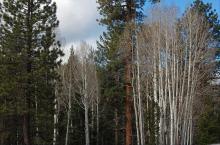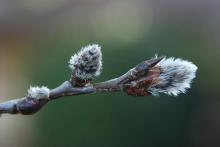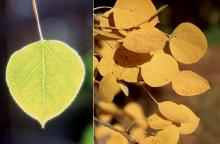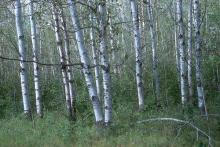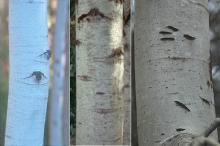Populus tremuloides
Common name:
Quaking Aspen
Pronunciation:
pop-U-lus trem-u-LOY-dez
Family:
Salicaceae
Genus:
Type:
Broadleaf
Native to (or naturalized in) Oregon:
Yes
- Broadleaf deciduous tree, 40-50 ft (12-15 m), pyramidal and narrow when young, long trunk and narrow, rounded crown when mature. Bark is thin, smooth greenish white to cream colored, furrowed dark brown or gray in old age. Leaves alternate, simple, thin, ovate to orbicular, 4-7.5 cm long, finely glandular serrate, lustrous dark green above, glabrous below. Fine yellow color in fall. Laterally flattened petioles allow leaves to flutter in the slightest breeze (to " quake"). Typically dieocious, male and female flowers on separte plants and in long sleder catkins that appear before the leaves. Male catkins are at first about 3 cm long and lengthening to 8 cm before falling off, the small flowers are tiers of red stamens mixed with long, silky hairs. The female flowers are in slender, pendulous catkins that lengthen to 10 cm and develop into a string of green fruit capsules, each about 6 mm, containing 10 minute seeds embedded in cottony fluff which aids in wind dispersal of the seeds.
- Sun or part shade. Grows in many types of soil, from loamy sand to clay. Fast growing and relatively short lived.
- Hardy to USDA Zone 1 The most widely distributed tree in North America.
- In their habitat, quaking aspen forms clones connected by a common parent root system. Since trees are typically dieocious (i.e., male and female flowers on separate plants), a given clone may be either male or female. However, some clones produce both male and female flowers. In the West, quaking aspen stands are often even-aged, originating after a single top-killing event.
- tremuloides: resembling Populus tremula, European Quaking Aspin, tremula, quaking, trembling, -oides, like
- Oregon State Univ. campus: south of Peavy Hall; also in front of the International Living and Learning Center on Western Ave.
Click image to enlarge

